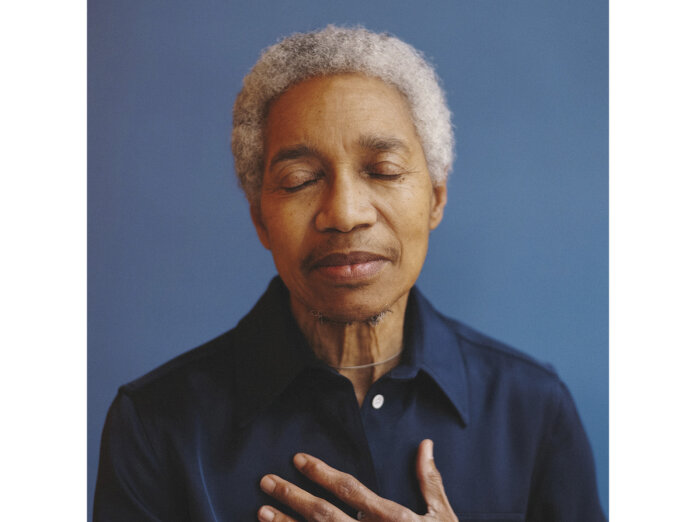Singer, songwriter and composer Beverly Glenn-Copeland was so far ahead of his time when he began writing and performing music that several decades had to pass before his audience revealed itself. A long life lived in between then and now fully informs the sweeping, expansive music on his new album ...
Singer, songwriter and composer Beverly Glenn-Copeland was so far ahead of his time when he began writing and performing music that several decades had to pass before his audience revealed itself. A long life lived in between then and now fully informs the sweeping, expansive music on his new album The Ones Ahead.
Born in Philadelphia and based in Canada, Glenn-Copeland’s musical trajectory began in the 1960s at Montréal’s McGill University, where he was the first Black student to be accepted in their Faculty of Music. His first couple of albums, both self-titled releases that came out in the early 1970s, blurred genre lines from the beginning, though they have the clearest connection to folk. Glenn-Copeland’s career went on to include performing as a backing vocalist with Canadian singer-songwriter Bruce Cockburn, working as an actor on the children’s show Mr Dressup for 25 years, and writing songs for Sesame Street. A defining moment occurred in 1986, when Glenn-Copeland discovered the world of digital synthesis and recorded Keyboard Fantasies, a gorgeous new age album. Only 200 cassettes were produced, most of which never even made it out of storage.
As the years rolled along and Glenn-Copeland explored different facets of music, art and life – including publicly identifying as a trans man in the early 2000s – the mysterious beauty of Keyboard Fantasies made its way around to record collectors and purveyors of adventurous underground cult music. It’s hardly a surprise that by the mid-2010s, that album would find a new global audience, eager to learn more about its enigmatic creator. Glenn-Copeland was in his seventies when he hit the road for his first ever European tour, in the process continuing to build out some of the songs that make up The Ones Ahead, his first album of new studio music in nearly 20 years and the first since the resurgence of interest.
The Ones Ahead is a triumphant, ecstatic album. It feels lived-in; it feels loved. This makes sense, as some of the songs had been gestating for over 30 years. His previous albums were largely individual efforts, but The Ones Ahead makes full use of Indigo Rising, the band that formed to support Glenn-Copeland live on that European tour. The additional musicians imbue his electroacoustic arrangements with depth and vibrance, the full band format an ideal vehicle for the prismatic genre-blurring that is seemingly inherent to Glenn-Copeland’s style.
And that style? The best word for it is syncretic, fusing as it does elements from folk, jazz, classical, new age, electronic and even gospel with his own distinct flair. The music is eclectic and far-reaching in scope and ambition, bringing most to mind artists like Kate Bush, or even Scott Walker without the darkness. The songs range from anthemic calls to action to sentimental ballads, traversing an emotional landscape that veers between the personal, the political and the complicated nuance of where the two meet. Glenn-Copeland is exploring his own history too, most immediately evidenced on “Africa Calling”, the album’s opening track. Described as a tribute to his West African heritage, the song makes use of the rhythmic skills Glenn-Copeland honed when studying with a djembe player named Dido. Despite being most well-known for his electronic experiments, Glenn-Copeland actually feels himself to be primarily a percussionist. In time, his drumming became a way to examine the longing he felt to more fully know his African roots.
Glenn-Copeland’s voice soars with emotion on the piano-driven “Harbour (Song for Elizabeth)”, a deeply heartfelt love song written for his wife and life partner of 14 years. The music is relatively sparse, but Glenn-Copeland’s voice is matched in strength with additional vocals from Indigo Rising singer Jeremy Costello, giving the song an operatic feel. On the other hand, “People Of The Loon” is instant energy, transmitting a sense of immediacy while channelling the power of indigenous teachings (another connection to his heritage, as his grandmother on his father’s side was Cherokee). The title track is another standout, unfurling like a dreamy spoken-word poem, expanding and refracting from serene keys behind Glenn-Copeland’s voice to a community of voices that practically transforms the song into a hymnal. Throughout all nine songs, Glenn-Copeland’s voice seems to exist on the eternal plane, powerful and vulnerable in equal measure, an elder sharing his knowledge in stirring sonic form.



